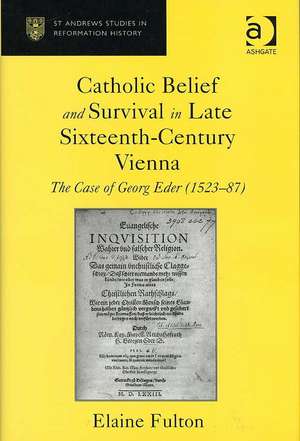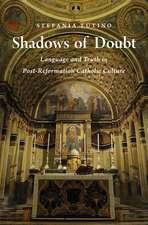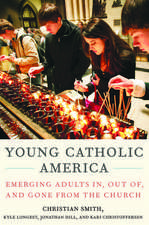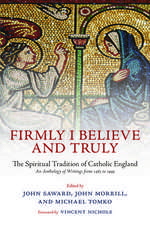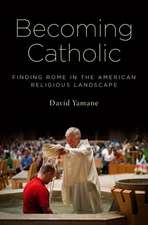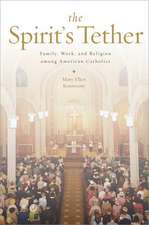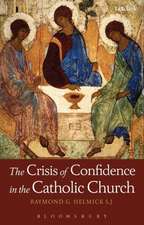Catholic Belief and Survival in Late Sixteenth-Century Vienna: The Case of Georg Eder (1523–87): St Andrews Studies in Reformation History
Autor Elaine Fultonen Limba Engleză Hardback – 9 mai 2007
Din seria St Andrews Studies in Reformation History
-
 Preț: 288.80 lei
Preț: 288.80 lei - 15%
 Preț: 683.95 lei
Preț: 683.95 lei -
 Preț: 311.51 lei
Preț: 311.51 lei - 23%
 Preț: 922.17 lei
Preț: 922.17 lei - 18%
 Preț: 1036.92 lei
Preț: 1036.92 lei - 25%
 Preț: 772.07 lei
Preț: 772.07 lei - 18%
 Preț: 983.38 lei
Preț: 983.38 lei - 25%
 Preț: 880.05 lei
Preț: 880.05 lei - 25%
 Preț: 768.30 lei
Preț: 768.30 lei - 15%
 Preț: 240.92 lei
Preț: 240.92 lei - 26%
 Preț: 822.34 lei
Preț: 822.34 lei - 18%
 Preț: 983.38 lei
Preț: 983.38 lei - 26%
 Preț: 765.43 lei
Preț: 765.43 lei - 25%
 Preț: 766.66 lei
Preț: 766.66 lei - 18%
 Preț: 983.38 lei
Preț: 983.38 lei - 25%
 Preț: 498.88 lei
Preț: 498.88 lei - 25%
 Preț: 767.88 lei
Preț: 767.88 lei - 26%
 Preț: 764.87 lei
Preț: 764.87 lei - 18%
 Preț: 1036.92 lei
Preț: 1036.92 lei - 18%
 Preț: 1044.68 lei
Preț: 1044.68 lei - 18%
 Preț: 988.03 lei
Preț: 988.03 lei - 25%
 Preț: 768.82 lei
Preț: 768.82 lei - 26%
 Preț: 765.19 lei
Preț: 765.19 lei - 18%
 Preț: 1045.03 lei
Preț: 1045.03 lei - 26%
 Preț: 764.20 lei
Preț: 764.20 lei - 25%
 Preț: 769.55 lei
Preț: 769.55 lei - 25%
 Preț: 768.30 lei
Preț: 768.30 lei - 25%
 Preț: 770.31 lei
Preț: 770.31 lei -
 Preț: 343.96 lei
Preț: 343.96 lei - 26%
 Preț: 765.84 lei
Preț: 765.84 lei - 26%
 Preț: 765.84 lei
Preț: 765.84 lei - 18%
 Preț: 987.25 lei
Preț: 987.25 lei - 25%
 Preț: 496.94 lei
Preț: 496.94 lei - 18%
 Preț: 984.92 lei
Preț: 984.92 lei - 25%
 Preț: 770.62 lei
Preț: 770.62 lei - 25%
 Preț: 739.65 lei
Preț: 739.65 lei - 25%
 Preț: 772.76 lei
Preț: 772.76 lei - 25%
 Preț: 767.47 lei
Preț: 767.47 lei - 18%
 Preț: 1053.98 lei
Preț: 1053.98 lei - 18%
 Preț: 1039.25 lei
Preț: 1039.25 lei - 26%
 Preț: 765.01 lei
Preț: 765.01 lei - 26%
 Preț: 764.20 lei
Preț: 764.20 lei - 18%
 Preț: 991.94 lei
Preț: 991.94 lei - 25%
 Preț: 768.46 lei
Preț: 768.46 lei - 26%
 Preț: 763.39 lei
Preț: 763.39 lei -
 Preț: 370.19 lei
Preț: 370.19 lei - 18%
 Preț: 1036.92 lei
Preț: 1036.92 lei
Preț: 1035.38 lei
Preț vechi: 1262.67 lei
-18% Nou
Puncte Express: 1553
Preț estimativ în valută:
198.15€ • 206.94$ • 164.29£
198.15€ • 206.94$ • 164.29£
Carte tipărită la comandă
Livrare economică 11-25 februarie 25
Preluare comenzi: 021 569.72.76
Specificații
ISBN-13: 9780754656524
ISBN-10: 0754656527
Pagini: 216
Dimensiuni: 156 x 234 x 14 mm
Greutate: 0.41 kg
Ediția:1
Editura: Taylor & Francis
Colecția Routledge
Seria St Andrews Studies in Reformation History
Locul publicării:Oxford, United Kingdom
ISBN-10: 0754656527
Pagini: 216
Dimensiuni: 156 x 234 x 14 mm
Greutate: 0.41 kg
Ediția:1
Editura: Taylor & Francis
Colecția Routledge
Seria St Andrews Studies in Reformation History
Locul publicării:Oxford, United Kingdom
Cuprins
Contents: Introduction; Eder's Vienna; Promotion and prominence, 1550-73; Service to the church, 1550-73; 1573: imperial condemnation; Wittelsbach patronage, 1573-87; 'Whoever is not like a Jesuit, is not a Catholic'; Conclusion; Select bibliography; Index.
Recenzii
’This is a solidly researched and carefully argued study...’ English Historical Review ’... an instructive case study in which the fruits of extensive archival research are presented in a convincing fashion, and with much engaging enthusiasm for its important subject.’ Journal or Ecclesiastical History ’... this deceptively modest book opens an important methodological pathway to the study of early modern Catholicism in central Europe.’ European History Quarterly ’[Fulton’s] careful research offers an important contribution to recovering a lesser-known voice of the Reformation era.’ Religious Studies Review ’... [Fulton’s] work constitutes the most important scholarly work to date on the role of Georg Eder and demonstrates the promising nature of future work on lay reformers for our understanding of early modern Catholicism.’ Sixteenth Century Journal
Notă biografică
Elaine Fulton is Lecturer in the Department of Modern History at the University of Birmingham, UK.
Descriere
Dr Georg Eder was an extraordinary figure who rose from humble origins to hold a number of high positions at Vienna University and the city's Habsburg court between 1552 and 1584. Pivoting around a dramatic incident in 1573, when Eder's ferocious anti-Lutheran polemic, the Evangelical Inquisition, fell under sharp Imperial condemnation, this book investigates key aspects of his career and adds significantly to the wider canon of Reformation history by re-examining the nature and extent of Catholicism at the Viennese court in the latter half of the sixteenth century.
